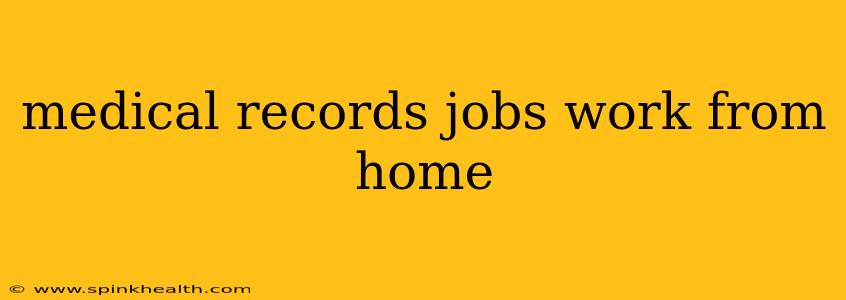The world of healthcare is constantly evolving, and one of the most significant shifts we've seen is the rise of remote work opportunities. For those with a passion for medicine and a desire for flexibility, the field of medical records offers a wealth of work-from-home possibilities. But navigating this landscape can be tricky. This guide will explore the various medical records jobs available remotely, the skills needed to succeed, and how to find the perfect work-from-home position for you.
Imagine this: you're sipping your morning coffee, the sun streaming through your window, and you're already making a difference in people's lives by ensuring their medical information is accurate and accessible. This isn't a fantasy; it's the reality for many medical records professionals working remotely.
What Types of Medical Records Jobs Can Be Done From Home?
The beauty of medical records work is the variety. Several roles lend themselves well to remote work, each with its own unique set of responsibilities and challenges.
Medical Records Technician/Coder:
This is perhaps the most common work-from-home medical records job. Medical coders translate diagnoses, procedures, and other medical information into standardized codes used for billing and data analysis. Technicians might focus on chart completion, ensuring all necessary documents are present and organized. This role often involves working with electronic health records (EHR) systems, requiring strong computer skills and attention to detail. Think of it as being a medical detective, ensuring every piece of the puzzle is in place.
Medical Records Clerk:
A medical records clerk assists in maintaining patient files, both physical and electronic. Duties might include data entry, filing, retrieving records, and responding to requests for information. While this role may require a lower level of medical knowledge than coding or abstracting, it's crucial to be highly organized and efficient. Imagine being the backbone of efficient information flow within a healthcare system.
Medical Transcriptionist:
For those with excellent listening and typing skills, medical transcription offers an excellent remote opportunity. Transcriptionists listen to audio recordings of physician dictations and convert them into written reports. Accuracy and medical terminology knowledge are paramount. This role requires a keen ear and a dedication to perfect accuracy, acting as a vital link in the chain of medical documentation.
Medical Biller/Coder:
While billing often involves interaction with insurance companies, aspects of coding can be performed remotely. The ability to decipher complex medical codes and accurately prepare claims is crucial for this role. Think of this as being the financial interpreter of complex medical information.
What Skills Do I Need for a Work-From-Home Medical Records Job?
Regardless of the specific role, certain skills are consistently valuable:
- Proficiency in EHR systems: Most medical records positions now utilize electronic health records, so familiarity with various software is crucial.
- Medical terminology knowledge: A strong understanding of medical terms and abbreviations is essential for accurate coding, transcription, and data entry.
- Data entry skills: Accuracy and speed are key when entering sensitive patient information.
- Attention to detail: Medical records are highly sensitive documents; precision is absolutely vital.
- Organizational skills: Managing multiple tasks and prioritizing effectively is crucial in a remote work environment.
- Strong computer skills: Comfort with various software programs and online platforms is a must.
- HIPAA compliance knowledge: Understanding and adhering to HIPAA regulations concerning patient privacy is non-negotiable.
How Do I Find Work-From-Home Medical Records Jobs?
The job hunt can feel overwhelming, but here are some effective strategies:
- Online job boards: Sites like Indeed, Monster, and LinkedIn often list remote medical records positions.
- Company websites: Check the career pages of healthcare organizations and medical billing companies. Many now actively recruit for remote roles.
- Networking: Connect with professionals in the healthcare field; word-of-mouth referrals can be invaluable.
- Freelance platforms: Sites like Upwork and Fiverr can offer short-term or project-based opportunities.
What are the advantages and disadvantages of working from home in medical records?
Advantages:
- Flexibility: Set your own hours (within reasonable limits, depending on the employer) and work from anywhere with a reliable internet connection.
- Comfort: Work in a comfortable and familiar environment.
- Work-life balance: Better integration of work and personal life.
- Reduced commute: Save time and money by eliminating daily commutes.
Disadvantages:
- Isolation: Working remotely can be isolating, so it's crucial to find ways to stay connected with colleagues.
- Technology dependence: You need reliable internet and computer equipment.
- Distractions: Maintaining focus can be a challenge working from home.
- Limited opportunities for advancement: Some remote positions might offer fewer career progression opportunities compared to office-based roles.
This journey into the world of remote medical records jobs is just the beginning. With the right skills, dedication, and proactive approach, you can find a rewarding and fulfilling career that offers both flexibility and the satisfaction of contributing to the healthcare industry. Remember to always prioritize your professional development and stay updated on the latest industry trends. Good luck on your job search!

